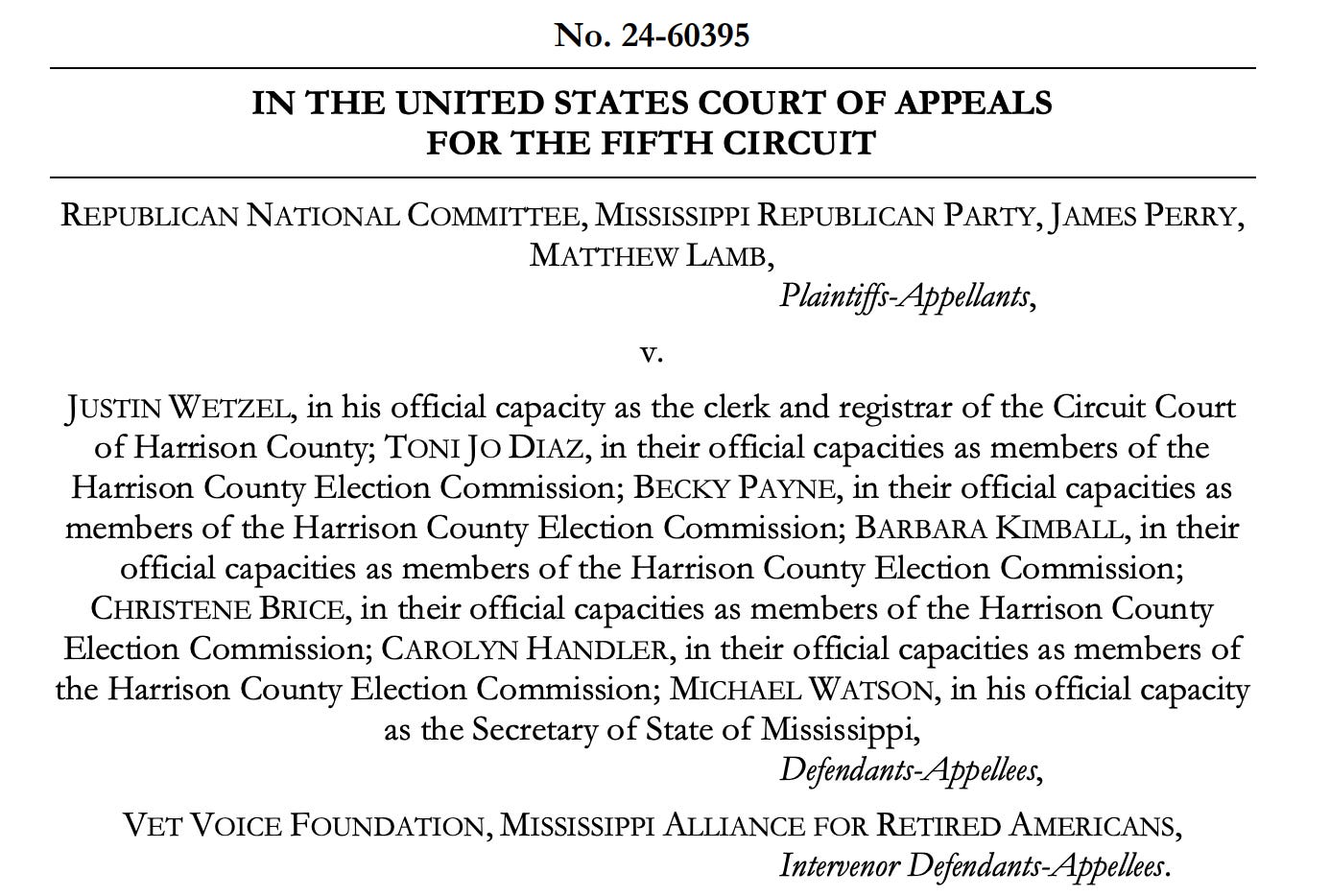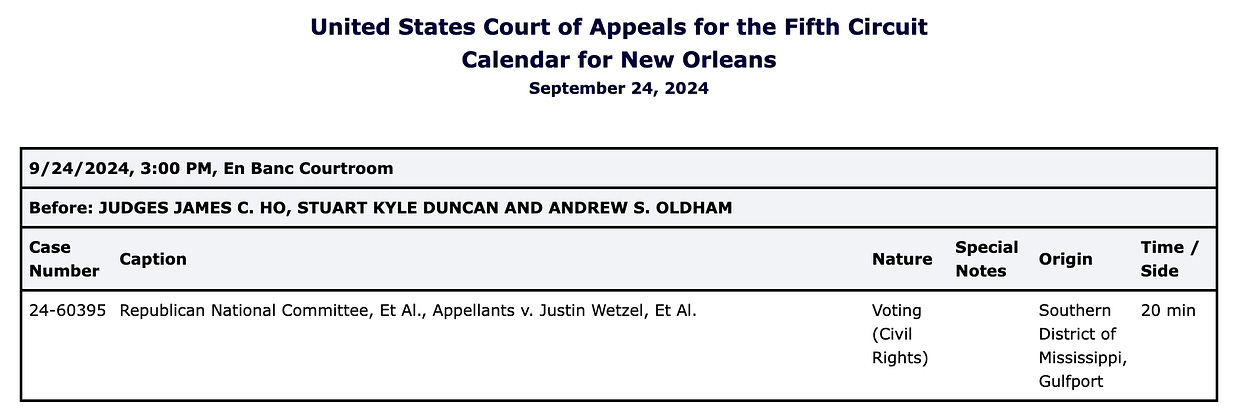Welcome to September at Law Dork, and thank you for being one of more than 36,000 people supporting Law Dork with a free subscription! I am so grateful. Journalism costs money, though, so please consider upgrading to a paid subscription now for as little at $6 a month. If you do that, you’ll receive bonus features available only to paid subscribers — and support this essential reporting. I know that not everyone can afford it or prioritize a paid subscription, and, if that’s you, I am so glad you are here! Thanks, Chris Mississippi mail voting case at the Fifth Circuit could quickly become a national issueJudges James Ho, Kyle Duncan, and Andrew Oldham — all far-right Trump appointees — will be hearing an appeal on Sept. 24 that is seeking to limit mail voting.Three of the most extreme right-wing Trump appointees are set to hear arguments next week in an election law case that could quickly make its way to the U.S. Supreme Court — and, if the challengers get their way, upend mail voting this fall. It’s a fringe case that shouldn’t go anywhere, but it’s 2024 so the lawyers involved appear to be trying to force the case up to the conservative justices to see if they’ll bite. The Republican National Committee, joined by the Mississippi Republican Party, and Libertarian Party of Mississippi filed a pair of lawsuits, which have since been consolidated, trying to block Mississippi from accepting mail-in absentee ballots postmarked by Election Day but not received until up to five days later, as is allowed under a 2020 law. In essence, the challengers point to a handful of federal statutes that set forth the fact that there is an “Election Day” and argue that, because of that, Mississippi is preempted from accepting any ballots received after Election Day. U.S. District Judge Louis Guirola Jr., a George W. Bush appointee, roundly and soundly rejected the arguments in a July ruling, but both parties appealed to the U.S. Court of Appeals for the Fifth Circuit. This case is, ultimately, not just about Mississippi — as the lawyers for a veterans group and retirees group that intervened in the case to support the law pointed out. “With the enactment of this law,” the lawyers wrote, “Mississippi joined the ranks of nearly thirty states and territories with similar laws, which help ensure that the results of elections reflect the choices of the voters who participate in them.” If this case reaches the Supreme Court, which became much more likely with Monday’s news of the judges hearing the appeal, it could have nationwide ramifications for all of those states’ laws. The Fifth Circuit — which includes Louisiana, Mississippi, and Texas — has 17 active judges. It is an extremely conservative court that is increasingly willing to accept arguments that either have never been considered because they’re so fringe or run directly counter to Supreme Court precedent.¹ On Monday, the Fifth Circuit announced the three-judge panel that will hear the case on September 24: Judges James Ho, Kyle Duncan, and Andrew Oldham. The three likely are — with issue-by-issue distinctions — the three furthest right of the six Trump appointees to the Fifth Circuit. To put that all together: These are the three furthest right appointees of the president whose appointees are some of the furthest right on what is arguably the furthest right appeals court in the nation. In short, the challengers got the best draw for these arguments imaginable — although part of that was of their choosing, having filed the challenges in Mississippi. Even with that, though, this is not a slam dunk at the Fifth Circuit because the merits of the case are so weak. Additionally, given that ballots are being printed in some states and are going out shortly, this case would be a key candidate for application of the so-called Purcell principle that counsels against courts ordering voting changes in the run-up to an election due to the confusion it would cause — although, whether the Purcell principle exists uniformly is in serious question. If it does still exist, this obviously is a scenario where confusion would be caused and Purcell would counsel not acting for this election. Whether that is so very well could quickly become a question for the Supreme Court — with its nationwide implications. The challengers’ argumentsThe Republicans’ brief focused on this idea that it never quite justifies — that sending a vote can’t finalize that vote and, in conjunction with that, counting votes cast by Election Day but received after constitutes “multiple voting days” in conflict with the federal Election Day laws.
The Republicans are represented by lawyers at Consovoy McCarthy PLLC, a conservative firm whose lawyers have represented Donald Trump in the past and who are regularly at the Supreme Court pushing conservative causes, and a Mississippi-based lawyer who previously clerked at the Fifth Circuit, Spencer Ritchie. They argued that “[d]ictionary definitions of ‘election’ confirm that Congress meant a single day for the election, not multiple days.” Later, they added that “legislative history confirms that Congress sought to curb a variety of evils posed by multiple voting days.” Of course, none of those arguments matter if counting ballots postmarked by Election Day but received an allowed time after that doesn’t constitute additional “voting days.” The case is further weakened by the “precedent” they claim. They primarily rely on a Supreme Court case about Louisiana not having any Election Day at all if a person in an open primary — where all candidates for a given office appeared on the same ballot — secured a majority of the vote. (They secondarily rely on a 1944 case from Montana, which says more about the strength of their case than almost anything else I can tell you.) The Libertarians’ brief is much of the same, with their lawyers from Judicial Watch — a conservative organization best known for its Freedom of Information Act-related litigation — arguing more explicitly that all of the similar laws elsewhere would not stand if they win here:
The defense of the lawWhat’s more, the Republicans and Libertarians are opposed in this effort by people on all sides, including Mississippi Attorney General Lynn Fitch, a conservative Republican. Fitch is defending the law, and argued this is a clear case:
The United States supports the law, highlighting the case’s implications for “the United States’ enforcement of the Uniformed and Overseas Citizens Absentee Voting Act of 1986, 52 U.S.C. 20301-20311 (UOCAVA), as amended by the Military and Overseas Voter Empowerment Act of 2009.“ As Justice Department lawyers wrote:
The Democratic National Committee has weighed in in support of the law, pointing out that the challengers do not offer any principled distinction in interpreting the Election Day laws between allowing votes to be received before Election Day but not those received after Election Day or between the many ballot counting-related tasks that occur after Election Day and the receipt of a ballot cast by Election Day after Election Day. As such, their lawyers conclude:
The veterans group — Vet Voice Foundation — and retirees group — Mississippi Alliance for Retired Americans — are represented by prominent left-leaning firm, Elias Law Group, as well as the Mississippi Center for Justice. They fight the argument that there is any support for the argument that the challengers’ aim would have been the intent of the drafters of those “Election Day” laws:
They also spend a significant part of their brief arguing that the challengers “badly misread the historical record to suggest that post-election ballot receipt deadlines are an entirely recent innovation.” A disability group, Disability Rights Mississippi, and the League of Women Voters of Mississippi, also weighed in — with lawyers from the ACLU Foundation, ACLU Foundation of Mississippi, and Dechert LLP — to highlight how voters with disabilities would be harmed if the challengers succeed. Law Dork will have more on this case as the appeal proceeds. 1 Only five of the court’s active judges were appointed by Democratic presidents. Generalizing a divide I’ve discussed previously, the Trump and Reagan appointees of the court are extremely right — lawless at times — while the George W. Bush appointees are mostly lawful and conservative — leading them to side with the moderate-to-liberal Democratic appointees at times. You’re a free subscriber to Law Dork, with Chris Geidner. To further support this independent legal journalism, please consider becoming a paying subscriber. |


